Great Moments From Great Comics #1: Steve Gerber's Howard the Duck
Great Moments from Great Comics is a new list feature that takes a detailed look at some of the [...]
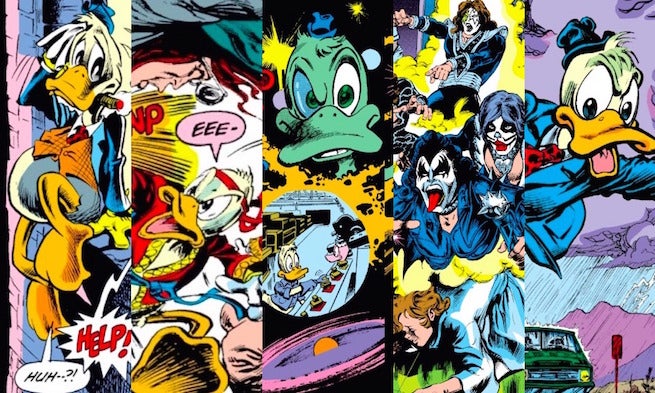
Great Moments from Great Comics is a new list feature that takes a detailed look at some of the greatest creative runs in comic book history and spotlights some of the most memorable, buzzworthy moments that helped define these stories.
With the recent debut of Howard the Duck #1 by Chip Zdarsky and Joe Quinones in mind, this entry will list 10 great moments from the original Howard the Duck solo series, which was written by Steve Gerber and featured art by Frank Brunner, Gene Colan and a host of others.
As one of the industry's very first (and funniest) satirical series, Gerber's Howard the Duck is considered a real game changer for the comic book world. Adding to the book's legendary status is the acrimonious fight between Gerber and Marvel following Howard's cancellation, which was one of the earliest disputes over creator's rights in the comic book industry.
Fortunately, thanks to the wonder of the Marvel Unlimited app, and/or an omnibus that was published late last year, a reader can blow through Gerber's Howard the Duck without ever having to worry about deadlines or legal squabbles. So sit your hairless ape behind down and enjoy some classic Howard:
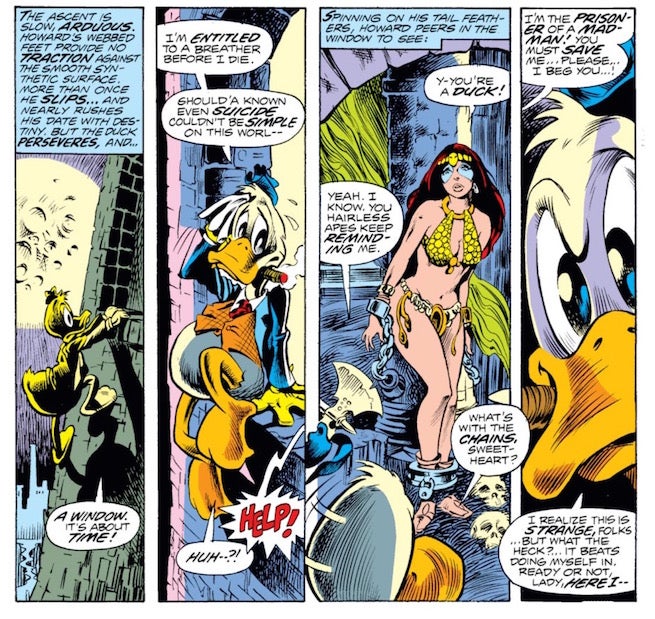
1. Meet Beverly Switzer
From: Howard the Duck #1
Unquestionably the most important supporting "hairless ape" in the Howard the Duck universe, Howard stumbles upon the beautiful model Beverly Switzer when scaling a tower made of credit cards so he could jump off the top and kill himself. Instead, he decides to bust out Beverly, who is being held captive by an evil magician accountant (as if there is any other kind of evil accountant) named Pro-Rata. If any of this sounds patently absurd to you, welcome to the world of Steve Gerber's Howard the Duck.
Beverly ends up staying by Howard's side as a friend and confidant for the majority of Gerber's run on the series. Despite her pronounced beauty, Howard's relationship with her never seems to extend beyond something very platonic — which, even in Gerber's bizarre world, makes sense since Howard's a duck and Beverly is a human being. Still, her introduction in Howard's first solo issue is a perfect demonstration of just how off the wall Howard the Duck would wind up being. In how many comic books is the beautiful human the sidekick to the foul-mouthed duck?

2. Howard and Spider-Man Team Up
From: Howard the Duck #1
Playing off the premise that Gerber's Howard the Duck was not going to be your typical superhero comic book series, Howard is paired off with the amazing Spider-Man in his battle against Pro-Rata. But instead of doing the predictable "heroes meet and then go fight the bad guy together" storyline, Gerber and artist Frank Brunner depict what is more likely to happen when if a talking duck and a superhero dressed up in red and blue spandex were to cross paths. Spidey acts shocked and surprised that a creature like Howard actually exists, while Howard points out the obvious when he tells Spider-Man, "you're not exactly Mr. Normal either y'know."
The Howard/Spider-Man exchange sets the tone for a series that would provide some very smart and insightful commentary about the modern state of superhero comic books. It's meta and self-aware in a way few other comics were at this point in the medium's history.

3. The Dawn of Turnip Man
From: Howard the Duck #2
Speaking of Howard the Duck's meta-qualities and self-awareness, in the second issue, Gerber and Brunner introduced yet another in a long line of atypical supervillains, a creature named Turnip Man who is half alien invader, and half security watchman. Gerber/Brunner actually model Turnip Man's origins/creation off of something one might have read in an old school Stan Lee/Jack Kirby monster magazine: security man Arthur Winslow stumbles upon a turnip and is hypnotized by it, allowing it to take over control of his body and in exchange receives powers that let him act out his fantasies as a hero. Of course, where this story differs from the world of Lee/Kirby is Gerber's monster is a Faustian alien turnip rather than a swamp monster or something else more typical of the genre. Of course, considering how Kirby and Lee came up with a giant talking tree named Groot, it's not like a mutant turnip is THAT crazy.

4. Quack-Fu
From: Howard the Duck #3
After riffing on traditional superhero team-ups in Howard the Duck #1 and Lee/Kirby monster magazines in Howard #2, Gerber uses the third issue of his series (illustrated by the great John Buscema) to poke fun of a more (at the time) modern part of the pop culture zeitgeist: kung fu movies/magazines. The issue starts out with Howard being disgusted by how human's glamorize violence in the form of kung fun movies. But he is emboldened to learn martial arts when a thug named Count Macho starts terrorizing the neighborhood, bullying anyone he finds to be an affront to his manhood.
Howard seeks the guidance of a trainer and becomes a master of his own fighting style, the appropriately dubbed "Quack-Fu," in just under three hours. Howard uses his new knowledge to take down Macho and his gang.
Howard would get only a few moments of physical dominance in his own series, so it's best to appreciate these scenes as they come. Still, even in showing Howard kick some butt, Gerber uses the sequence to play around with the ethical/moral dilemmas that often accompany suprehero/vigilante her comic books. While fighting Count Macho, the bully falls of a rooftop and plummets to his death. Howard, naturally bemoans the death of his adversary, questioning whether or not the victory was actually worth the loss of life.

5. Howard's Campaign is Washed Out
From: Howard the Duck #8
Howard the Duck's satirical ways weren't only saved for comic books and other obscure bits of pop culture. In 1976, Gerber's series evolved into a piece of political satire, mocking the presidential race that (in real life) saw eventual winner Jimmy Carter take on incumbent Gerald Ford. Howard was recruited into running for POTUS part of the the fictitious "All-Night Party." The storyline was such a hit with readers that Howard actually received a fair number of write-in votes that November.
This being Gerber's Howard the Duck, the campaign/election issue is filled with some on-the-nose humor regarding the authenticity and trust worthiness of American politics. Howard becomes a sensation for the sheer fact that he just doesn't care what people though of him and he tells the truth about everything. As the election gets closer, Howard's handlers find that people either wanted to vote for him or murder him. Unfortunately, Howard's campaign is torpedoed in the most typical/predictable way possible. A photo of him in the bathtub is doctored so it would appear that he is bathing with Beverly. Telling the truth about the corrupt two-party system wasn't enough to derail his chances at being president (not to mention being a duck), but the suggestion of him being naked in a bathtub with another woman made his candidacy a non-starter.
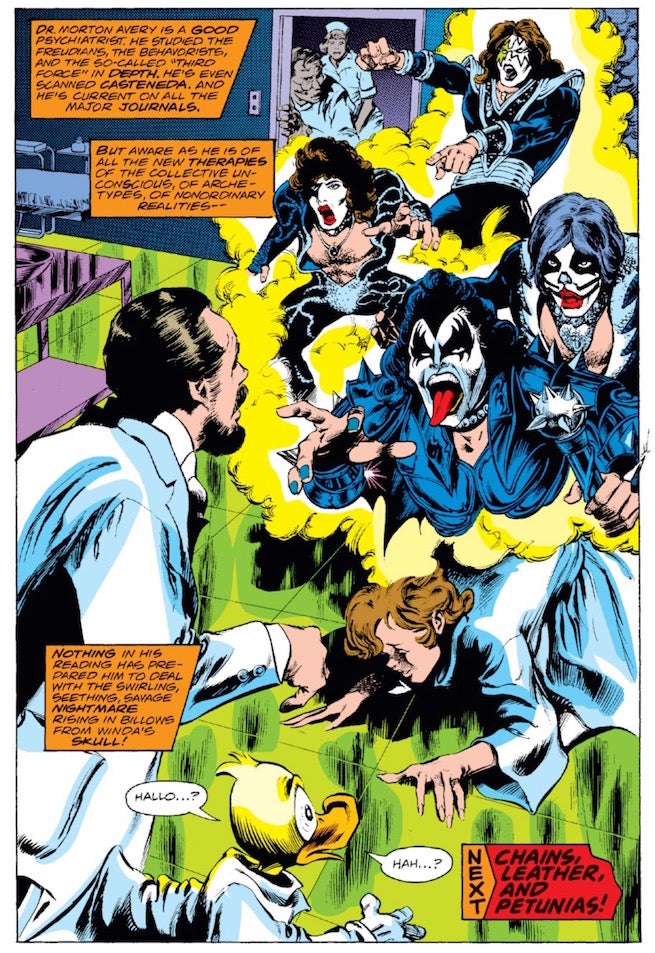
6. Kiss ... In Comic Book Form!
From: Howard the Duck #12
OK, all you rock and roll/comic book history buffs; here's an answer to a trivia question if the need should ever arise. Shortly before Gerber penned the Marvel Comics Super Special #1: Kiss in 1977, the band made their very first appearance in comic book form in Howard the Duck #12. The band shows up at the very end of an almost Alice in Wonderland-esque issue that ends with Howard being locked in a padded room in a straight jacket. No, the band's blood wasn't mixed in with the ink of this Howard the Duck issue.
Kiss's comic book debut is actually quite significant from a comic book history perspective. The late 1970s were not a kind time for comics in terms of sales and popularity with many series (like Howard) dealing with scheduling delays and other editorial inconsistencies. It took some outside the box thinking and some shrewd business movies for certain companies to keep themselves afloat. For Marvel, that came in the form of licensed properties. Star Wars of course was the most famous of these licensed properties to be adapted into a comic book, but the usage of Kiss marked the beginning of a long-standing relationship the band had with the medium. With their crazy costumes and make-up, Kiss was a natural fit for comics. But even with the power of hindsight, stumbling upon the final page of Howard #12 when the band just randomly shows up just encapsulates the unpredictability and joy that emanated from Gerber's series.

7. Howard Goes Cosmic
From: Howard the Duck #14
Proving that he was more than capable of keeping up with the cosmic stylings of Jim Starlin and Chris Claremont, who were penning some other-wordly material for Marvel during the late 1970s, Gerber went in a far out direction with Howard when the character is possessed by the satanic portion of Damion Hellstrom's soul.
The net result is a scene that mixes the higher consciousness of Doctor Strange with pure, unbridled Gerber-style sarcasm and satire. Artist Gene Colan creates a wonderful double-page spread depicting what Gerber describes as Howard's "psychic mist." Howard is living a thousand different lives "all at once" — basically seeing things through the perspective of anyone he had ever come into contact with: the street punk, the housewife, the assembly line worker … even a wealthy businessman.
Part of what makes this scene work so extraordinarily well is how Gerber totally sells this moment as some kind of higher level of consciousness for the character, when in reality, it's just making a mockery of all of the verbose, self-important stories and characters that were appearing with regularity in such books like Warlock and Captain Marvel.

8. Zen in the Art of Comic Book Writing
From: Howard the Duck #16
The next time you find yourself frustrated by the fact that one of your favorite comic book series has either fallen a few months behind schedule, or has issued a "filler" issue from a substitute creative team, remember that the alternative to either of those options is what Gerber put forward in Howard #16.
Of course, Gerber's somewhat adversarial relationship with those in postitions of authority at Marvel has now become the stuff of legends. But quite simply, a comic like Howard #16 would never ever see the light of day in today's world of advanced solicitations and stricter editorial oversight. With Gerber running desperately behind on deadline, Howard the Duck #16 was at risk of being delayed a month when the writer decided to do something completely different with his series. He published what turned out to be a long-form essay about why he missed his deadline, his move from New York City to Las Vegas, and some other general musings and criticisms about the industry in which he worked. "Zen in the Art of Comic Book Writing" is actually an astounding piece of writing, filled with keen insights and humor befitting of a satirical master like Gerber. But my goodness, could you imagine what kind of comic Gerber could have produced if he channeled his energies towards actually meeting his deadline?
Still the absolute absurdity of this comic's existence has made it one of the most controversial (and memorable) comics to be published in an era that was filled with controversies.
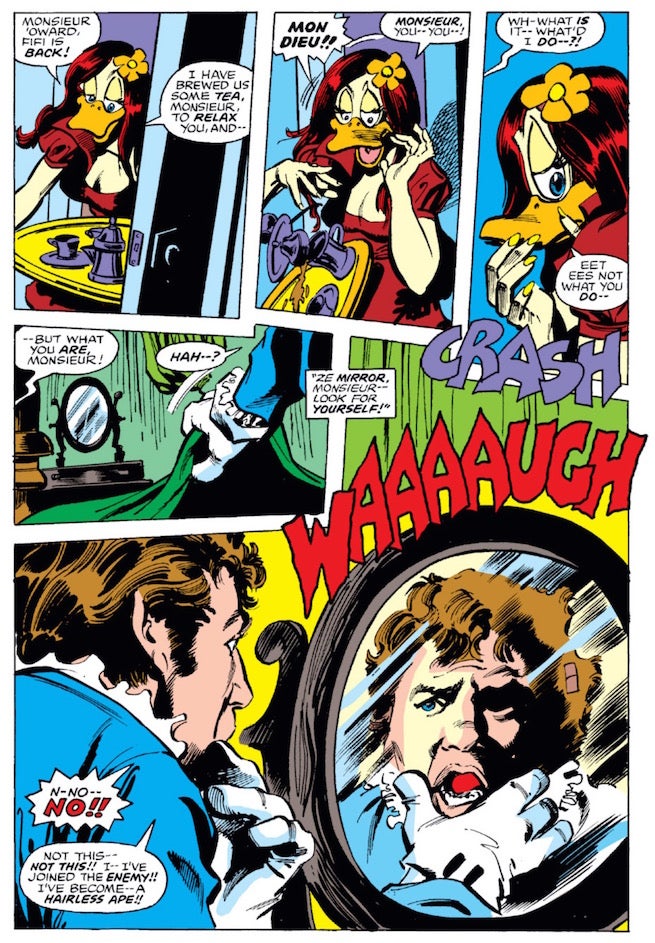
9. Howard the Human
From: Howard the Duck #18
As Howard the Duck marched towards its truncated finish, it started to become abundantly clear that Gerber saw a little bit of himself in his creation — at least that's how it certainly came across in storylines like 1977's "Howard the Human." Here, Howard and Beverly are kidnapped by a villain named Dr. Bong. Bong experiments on Howard and after a chemical explosion, he is transformed into a man. Howard is clearly unhappy with this metamorphoses, exclaiming that he "joined the enemy" and became another "hairless ape."
But beyond his dismay with his physical appearance, the comic makes an interesting point of commentary about Howard's surly behavior. While being a talking duck who chomped on cigars was almost endearing, as a human, Howard's actions and loner ways made him resemble more of a vagabond or a hobo. He wakes up on a park bench and is chased back to a home he doesn't have by a police officer. Perhaps this is a bit of an over-read, but it almost comes across like Gerber is commenting on his own behavior as an artist. His take-no-prisoners style worked, in larger part because the character who espoused these viewpoints was an absurdist talking duck. But as a man, these viewpoints and vocal opinions were generally frowned upon and made more enemies than friends.
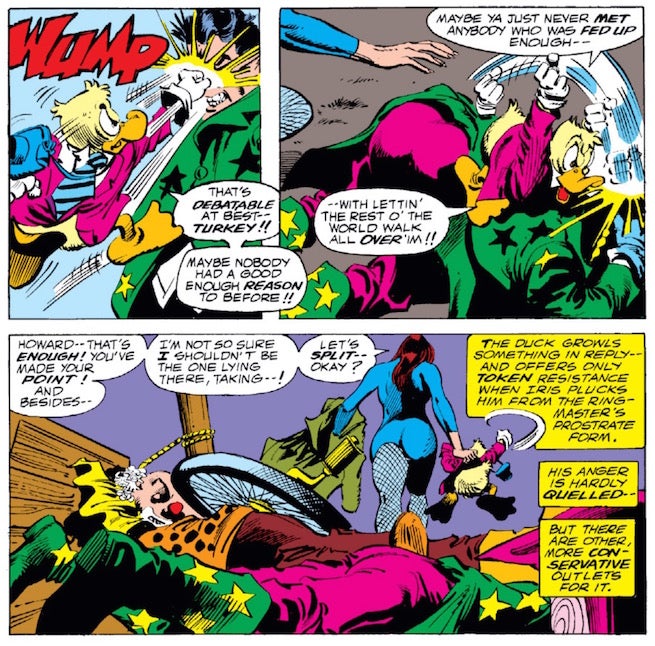
10. Howard's Anger Boils Over
From: Howard the Duck #27
Jumping off of Gerber's self-awareness (as mentioned in entry No. 9), in one of the final Howard issues he would write, the comic begins with Howard on imaginary trial, accused of being too negative. Howard responds that he's not negative, he's "angry."
In terms of how this series may have reflected real life, Gerber had a lot to be angry about when Howard #27 was published. At this point in history, Gerber's grip on the character and series he created was slipping away, as Marvel editor-in-chief Jim Shooter demanded accountability from his creators, especially when it came to making deadlines. In comic book terms, Howard had been embroiled in a fairly generic storyline where he was captured by the magician-turned-criminal, the Ringmaster, and forced to tell jokes while the Ringmaster's goons robbed the audience. Howard becomes fed up with being used and abused, and channels his rage towards his captors, snapping and beating the Ringmaster senseless.
Gerber would be off the series within a few months of this issue being published, making one think that maybe Howard's sudden violent turn against the Ringmaster was a bit of vicarious living courtesy of the writer. Or maybe Gerber just wanted to close out his run with a big moment like Howard beating the holy heck out of a D-list baddie like the Ringmaster. Either way, it's an incredibly entertaining sequence.
0comments